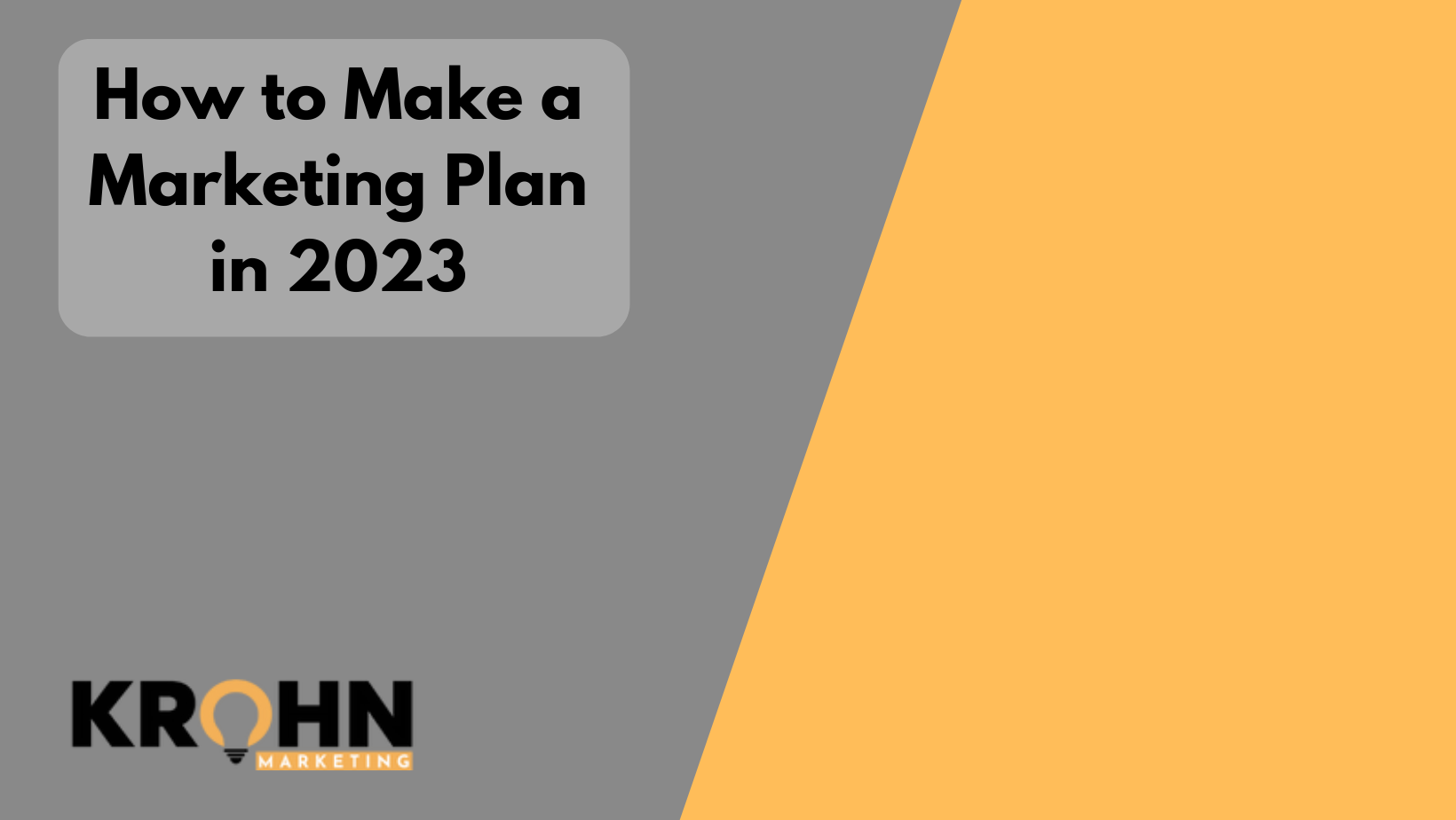How to start marketing and not get taken advantage of
So you’ve decided to begin your new venture (congratulations!). Chances are you aren’t 100% sure where or how to start marketing your products and services to bring in the major customer and cash haul you’re looking for. We can’t blame you. You’ve poured your blood, sweat, and tears into this venture and you’re ready to kick butt, take names, and get some results.
Stop for a second, though.
It’s great that you’ve nabbed that venture and are ready to go, but have you considered how to go to market? Or are you just going to hire one of those agencies to “do the things?”
Please don’t do that, even though what I’m asking here isn’t easy.
Learning about how to market your business isn’t an easy task - it’s gradual, intentional, and takes time. Even if you hire vendors, you HAVE to know what they’re doing, if they’re taking advantage of you, and how to navigate the situation accordingly.
Don’t make the mistake that so many small businesses and start-ups we’ve come across do, which is to trust fall into the empty abyss of vendors and contractors that just copy their strategies from marketing databases and top influencers on their LinkedIn feed.
I’m watched your hard-earned investment dollars fly out the window in my mind just writing that last sentence.
Before you get started marketing your business, you should try to understand the two different types of marketers you will most definitely encounter on your journey. This will help get you started regarding how to start marketing your business and avoid being taken advantage of.
Understand Your Contenders: Know-It-Alls v. Realists
If they claim to be the “experts” - run. No one is an expert in marketing (Yes, I actually said that).
Instead, there are really, two different types of marketers: know-it-alls and realists.
Side note: Just because you’re the CEO of a new venture and like to read marketing books does not mean that you fall into either of these categories. You’re simply a CEO or other C-level with the ability to ingest knowledge about a department that you shouldn’t be running, but should understand at a high-level.
When you're in search of a marketing expert, you'll first come across marketing know-it-alls - who literally know nothing. And that’s because knowing everything about marketing means that you have to understand every market, every customer, every persona, every company and every team member that every company has on the planet - and that’s impossible.
What you’ll also discover about marketing know-it-alls is that they’re the most dangerous marketer you will ever work with who will empty your piggy bank faster than you can say "sucker".
Due to their self-proclaimed universal knowledge and high-cost, as far as marketing strategy goes, it’s their way or the highway. They heard it on a podcast yesterday, so it must apply to everything you’re doing. And, if you question them, they threaten to walk away or will quote the latest from Seth Goden’s book they grabbed at Barnes and Noble last weekend to change your mind.
Bottom line: Know-it-alls always make it about them and nothing is about you. If you have these people in your circle right now - let them go.
They will not help you learn how to start marketing your business.
On the opposite side of things, you'll then run into the marketing realist. They'll work with you on the realities of YOUR marketing needs and ask questions like, "What’s your budget?", or "What’s realistic for your company to accomplish considering your internal team bandwidth and external available support?", or ?What’s real about your product versus an idea in the works that you want to promote?"
A good marketing realist will smack your hand for getting too close to that hot stove and bring you back to Earth when you decide to take a trip to outer space (without Jeff Bezos). A good marketing realist takes what you have, along with real, practiced formulas and quick wins to get your company what you really need: ROI and customer data - stat.
So, make sure that you know who you’re working with, otherwise, marketing your business will make you wonder how you’ve spent so much and accomplished so little.
Getting Started Marketing Your Business
Now that we’ve cleared up that necessary section, I have a disclaimer for you: marketing is not easy. Do not feel ashamed or inadequate if you haven’t been able to do it well thus far or don’t know where to begin. This is why professionals dedicate their entire lives to marketing as well as continuing to learn about it.
One of the biggest challenges a small business will face when trying to dive into how to get started with marketing is how many avenues there are to market your business.
Social media, email marketing, direct sales automations, paid ads, SEO, backlinking, content marketing, lead funnels, growth hacking, influencers…. Need I go on?
Your company can have all of these things, but without a clear and quantifiable strategy, marketing your business quickly becomes overwhelming, time-consuming, and ineffective.
So, the first place to begin is to understand what marketing assets and channels are available to you and why - so, let’s dive in.
Essential v. Non-Essential Marketing Assets and Channels
First of all, what's the difference between a marketing asset and a marketing channel?
Great question - thanks for asking.
According to our friends at SmartSheet, a marketing asset includes anything used by an organization to promote its products, services, or brand. A marketing channel is the distribution channel that your assets are placed on. For example, a marketing asset could be a social post, whereas a marketing channel for that asset would be Twitter, YouTube or Facebook (the social platform which hosts the post).
A non-essential asset is a marketing asset that does not support your goals. As an example, you may want to create a blog. But, when you’re done, you’re thinking that an eBook would be great to create from the blog you just wrote. Those are both great things, but if they're not a part of an overall plan or campaign - it's just fluff and becomes non-essential.
What makes an asset essential is how it’s woven into your strategy to make money.
That’s why you're in business - no matter what your external mission, vision, and values statements are.
How else do the bills get paid? Let's not kid ourselves and think that you're reading this post because you're a full-time philanthropist with an itch to learn something new. Money matters.
So, how do you quantify the return on these essential assets?
If it’s a blog you’re writing - is it a guest post for a highly trafficked partner that will help drive leads to your site? If it’s an eBook, have you developed your website enough and have constant traffic for that eBook to give you the MQLs (marketing qualified leads) you’re looking for? Being able to quantify the "why" behind these assets will lead you to understanding your ROI.
Nonessential marketing assets are typically a great idea and usually stem from those life-changing, off-site meetings with your peers or investment team, but don’t result in short term revenue (if any at all).
Essential marketing assets are those that can be directly tied to your revenue goals with near-immediate gain.
Here are a list of essential marketing assets that your start-up should create right off the bat to help you start marketing your business:
- Yes, you need a website - yesterday. More than 5 pages, with royalty-free images, about 500 words of copy per page and basic SEO added to headings, meta descriptions, and all of your page copy. Don’t know how to handle SEO? You’re not alone, but you don’t need to hire a $10k/mo firm to figure it out when you first get started. Connect with us and we’ll recommend a few free tools for you.
- Datasheets and product outlines. People care about what you’re selling - heck, they’re online because they’re searching for a solution to their problem. But, if they can’t understand what you’re selling and why - you’re a terrible solution for them, so get on that and understand what it is that you’re offering and why someone needs it.
- Brand Guidelines and a clear, high-quality logo and color palette. You can’t look like you don’t know what you’re doing if you’re in business. Having a logo created in Microsoft Paint isn’t going to cut it. HEX codes, brand standards, various file types of your logo and tagline are 1000% necessary assets to get rolling. Start with something like Canva if you can’t hire a designer to do it for you.
- A simple CRM and CMS. Oof. Here go the acronyms again. A Client Relationship Management System and Content Management System are essential for your start-up. We recommend HubSpot Free CRM and low-cost (about $25/mo.) CMS for several reasons (check out the link to learn why). Learning how to use the platform is also key. Software is only as good as what you put into it. No data in = no data out and a waste of your time.
- A solid marketing strategy and budget. Yep, a real live marketing strategy with a marketing budget that can tell you what you can do by how much you can spend. Don’t just make “the things” because someone else is doing it. It has to make sense in supporting your goals and also fit into your budget.
Not getting taken advantage of
With such instant access to the internet, it’s no surprise that there is a plethora of content related to marketing and how to work the techniques available. And like I mentioned above, everyone’s seemingly the “perfect partner for your business”.
You and I both know that’s not true.
The best marketer for your business is first, you. No one understands more about your product or service than you do. However, that’s where the buck stops, because you need to focus on running your business - not marketing it... but then in comes the marketing know-it-alls and realists - and there are thousands of them.
So, how do you not get taken advantage of when starting to market your business? How do you avoid the know-it-alls?
- Ask questions. And make sure that they’re the kind that demand transparency. i.e. What was the last problem you had with a marketing campaign? When did something not work and what did you do about it? How long has your longest customer been with you and why?
- Ask for a referral from former clients or long-term current clients. They should have a history of success with start-ups and doing what they claim to do. Period.
- Don’t take the first bite. Take time to think about their offer and get a few other proposals before you sign on the dotted line.
At the end of the day, there’s a lot that goes into marketing your business. There’s also a lot that goes into finding the right people to partner with to help you do so.
If it’s any consolation, you’re not alone. There are thousands of people just like you every day taking their life savings or the risky investment of money from others to get going. And that’s important for your partners to realize.
At Krohn Marketing, we abide by a few policies:
Our clients' money is treated like it’s our money. How it’s spent, what it yields - all matters. Every. Single. Penny. Waste is NOT okay here.
Lying is for idiots. Inflating numbers, stretching data, and bloating your reporting for how campaigns are run is an absolute NO here. It’s disdainful and one of the lowest things you can do for a client.
Speak the truth - even when it hurts. We practice diplomacy, couth, and social etiquette, but there’s no guessing with us. You will always know what’s going on and can talk to us anytime for honest feedback about what’s happening in your business.
It’s about you, period. One common phrase you’ll hear us say is, “It’s about what you need, not us.” And that’s true, every time.
So, I’ve dropped quite a bit of information on you for how to market your business and not get taken advantage of. And guess what? There's more to go along with that. The real world is always changing and how you do business changes daily.
If you want to connect to talk more about how to start marketing your business, we’re here.
Drop us a line and let us know what’s on your mind.




.png)